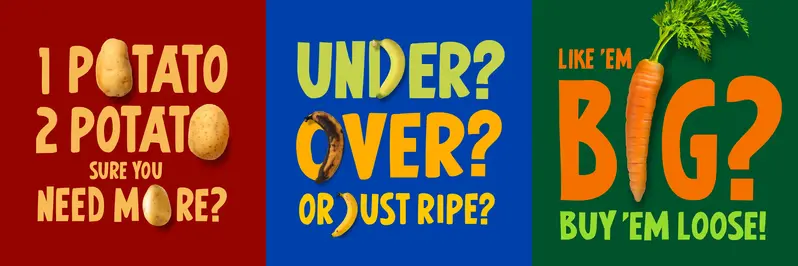Last Updated: 19 March 2024
Food is a universal need, so it's no wonder so much of our life is centred around it - it nourishes us, fuels our bodies and brings people together.

Yet, a shocking amount of food never reaches the table. This Food Waste Action Week (18-24 March 2024), the theme "choose what you'll use" encourages us to take a stand against food waste, and it all starts with a simple but impactful action: embracing loose produce.
The shocking cost of food waste: Did you know that the average household of four throws away food that amounts to a staggering £1,000 every year? That's a significant chunk of money wasted on food that could have been enjoyed. Food Waste Action Week, a campaign by the Waste Resource Action Programme, aims to change this by empowering shoppers to make smarter choices and save money.
Loose produce: A win-win for your wallet and the planet: This week, WRAP has revealed a compelling fact: by simply choosing loose produce, we could prevent a whopping 60,000 tonnes of food waste annually in the UK. Imagine that: over 8.2 million shopping baskets overflowing with perfectly good food, enough to fill 6,500 waste trucks, saved from unnecessary disposal. To put this into further context, 4.7 million tonnes of edible food is thrown away each year by UK households. Shockingly, 25% of this wasted food is as a result of people cooking, preparing or serving too much - this costs UK households £4.9 billion each year.
To recycle all of this food going to waste would enable the anaerobic digestion industry to reduce the UK's greenhouse gas (GHG) emissions by around 5%. Because food emits methane in landfill, it's a potent source of GHGs. It's estimated that if food waste were a country, it would be the third largest emitter of GHGs globally.
The power of 'Choose What You'll Use': The "choose what you'll use" theme highlights the importance of mindful grocery shopping. By buying loose produce, we take control of exactly how much we need. This reduces the risk of buying more than we can use, leading to spoilage and waste. The benefits extend far beyond individual wallets:
- Financial savings: Avoiding over-packaged produce translates to direct savings for households.
- Reduced food waste: Choosing loose produce can significantly decrease the amount of food we throw away, a win for both our wallets and the environment.
- Less plastic packaging: By opting for loose fruits and vegetables, we contribute to reducing plastic packaging waste by an estimated 8,800 tonnes per year.
- Environmental impact: Tackling food waste and plastic packaging reduction has a combined positive impact, saving over 80,000 tonnes of CO2 equivalent emissions. This helps mitigate climate change and create a healthier planet.
Food Waste Action Week has been launched with a comical viral video, featuring celebrity chef Gino D'Acampo. You can watch it below.
A two-pronged approach: The fight against food waste requires a collaborative effort. WRAP champions a two-pronged approach:
- Empowering consumers: Initiatives such as Food Waste Action Week raise public awareness about the advantages of buying loose produce, encouraging shoppers to make conscious choices.
- Engaging retailers: WRAP also strives to work with retailers to encourage them to offer more fresh produce options without excessive packaging. This increases accessibility for shoppers seeking to reduce waste and embrace sustainability.
As champions of sustainability Severn Trent Green Power encourages reduction and reuse of food wherever possible, and by reducing plastic we can also do more to extract the benefits of the food waste if indeed it finds its way to us at the end of its life. We currently recycle more than half a million tonnes of food waste every year, generating enough renewable energy from it to power more than 100,000 homes and creating a nutrient-rich bio-fertiliser that can be spread back to land as a soil improver to help grow even more food.
Every bit counts. By simply choosing loose produce when possible, we can contribute significantly to tackling food waste, saving money, and reducing our environmental footprint. If you want to find out more about Food Waste Action Week, check out WRAP's website here.